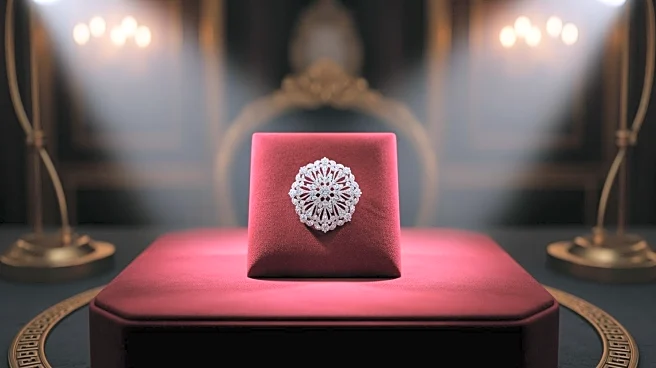What's Happening?
A diamond brooch, once lost by French emperor Napoleon during his retreat from the Battle of Waterloo, has been sold at a Geneva auction for over 3.5 million Swiss francs, equivalent to approximately $4.4
million. The brooch, which can also be worn as a pendant, features an oval diamond weighing over 13 carats surrounded by smaller cut diamonds. The sale price significantly exceeded the pre-sale estimate of 200,000 francs. The brooch was discovered among Napoleon's personal belongings in carriages that were delayed on muddy roads as he fled from the British forces led by the Duke of Wellington and the Prussian army under Field Marshal von Blücher. For over two centuries, the jewel was part of the heirlooms of the Prussian Royal House of Hohenzollern. Sotheby's did not disclose the identity of the seller, and the buyer was identified as a private collector.
Why It's Important?
The sale of Napoleon's diamond brooch highlights the enduring fascination with historical artifacts and their provenance, particularly those associated with prominent historical figures like Napoleon. The auction comes in the wake of a recent robbery of Napoleonic jewels from the Louvre museum in Paris, adding intrigue and allure to the sale. The high price achieved at auction reflects the global interest in Napoleonic history and the value placed on items with significant historical connections. This event underscores the importance of provenance in the valuation of historical artifacts and the role of auctions in preserving and transferring cultural heritage.
What's Next?
The successful sale of Napoleon's brooch may encourage further interest and investment in historical artifacts, particularly those with notable provenance. Auction houses like Sotheby's may continue to see increased demand for items linked to historical figures, potentially leading to more high-profile auctions. The recent theft of Napoleonic jewels from the Louvre may also prompt increased security measures for similar artifacts in museums and private collections. Collectors and historians may closely monitor upcoming auctions for opportunities to acquire items with significant historical value.
Beyond the Headlines
The sale of Napoleon's brooch raises questions about the ethical considerations of auctioning historical artifacts, particularly those with complex histories involving war and displacement. The provenance of such items can be contentious, and their sale may prompt discussions about the ownership and stewardship of cultural heritage. Additionally, the fascination with Napoleonic artifacts reflects broader cultural interest in historical narratives and the figures who shaped them, highlighting the role of auctions in connecting the public with history.










